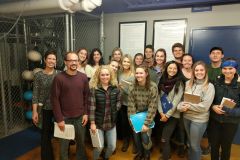The Lives of Animals Research Group emphasizes research-teaching linkages in two ways.
First, graduate and undergraduate student mentoring and training is important for scholarly skills development and knowledge dissemination on human-animal relations. Our group members include highly motivated, interdisciplinary, and adventurous students who learn how to engage academic literature, conduct rigorous fieldwork, and contribute to policy-related discussions. We emphasize action-oriented research (merging theory with everyday life) and encourage students to reach their potential as socially-engaged citizens and successful professionals in academic, policy, or service realms.
Second, university course development and pedagogical innovation is important for bringing attention to human-animal relations within graduate and undergraduate classrooms. As instructors, teaching assistants, or students ourselves, we hope to shed light on the lives of animals by offering courses, presenting guest lectures, or engaging animals in class assignments where possible.
For example, our first-year undergraduate seminar on The Lives of Animals at the University of Guelph in 2012 featured multi-disciplinary approaches and experiential learning to understand animals, their lives, and their centrality to human society. We engaged with scientists, social theorists and practitioners – highlighting their specific research, insights and perspectives on animals – and visited an arboretum, abattoir, industrial farm, zoo, rehabilitation centre, and research facility to engage with animals themselves. The course fostered in-depth understanding and appreciation of animal lives for students, instructors and guest lecturers alike. (Course PDF available here).
This course was adapted and offered as a third-year course at Queen's University in 2017 featuring Animal Geographies and the lives of animals in various spatial contexts. (Course PDF available here).



